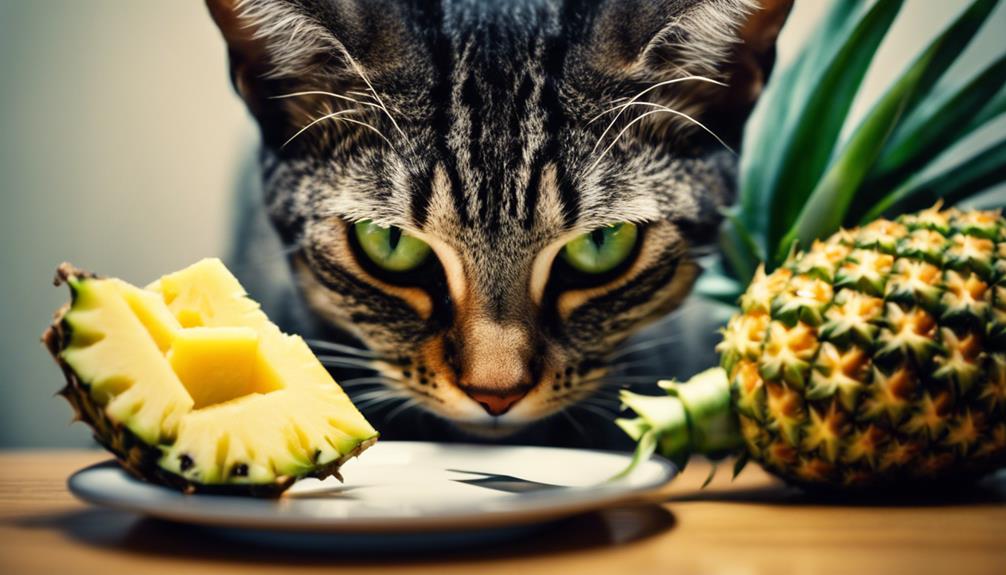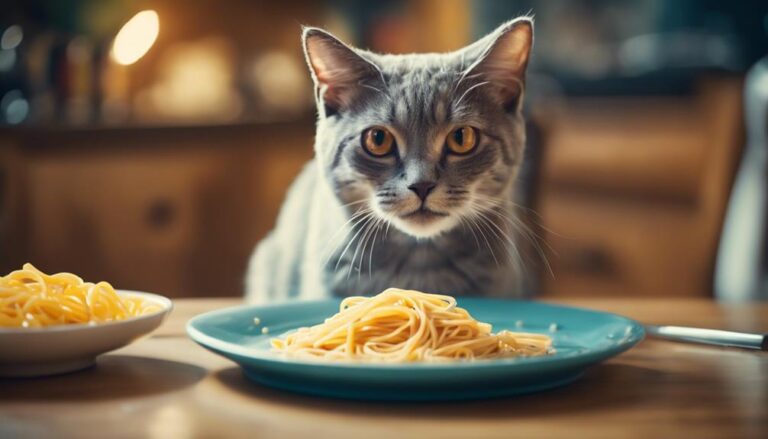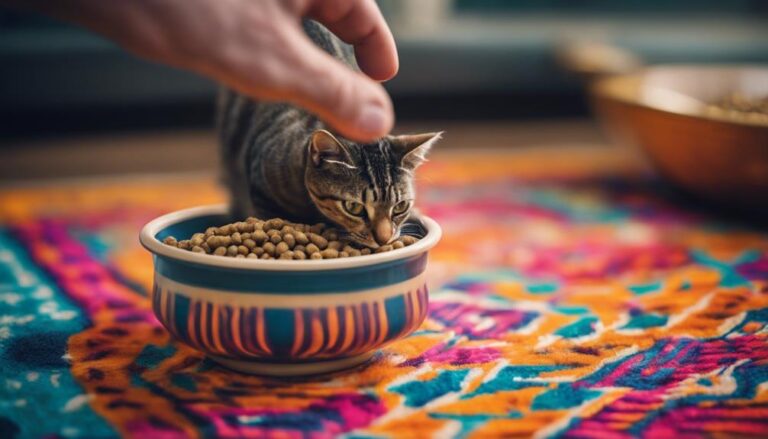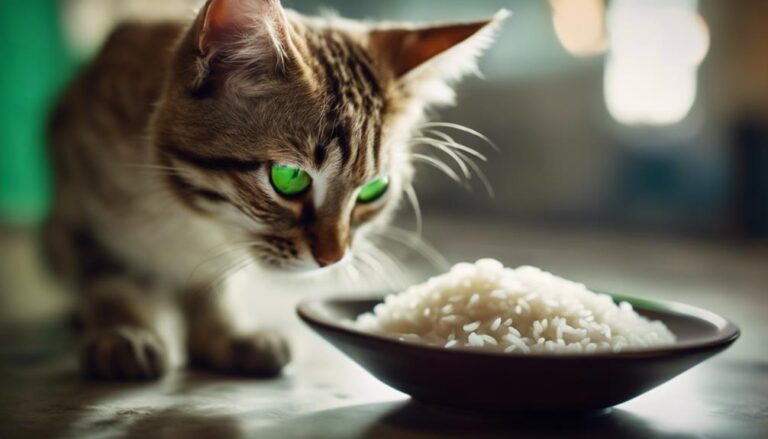If you've ever wondered about offering your feline friend a taste of pineapple, you might want to pause and reconsider. While the idea of cats munching on this tropical fruit is intriguing, there are crucial factors to ponder. The potential effects on your cat's health and well-being may surprise you, prompting a reassessment of what you thought you knew about feline dietary habits. Before you make any decisions, let's explore the intricate relationship between cats and pineapple further.
Potential Benefits of Pineapple for Cats
Rich in essential vitamins and minerals, pineapple can offer potential benefits for your feline companion. While cats are obligate carnivores and have specific dietary requirements, incorporating small amounts of fruits like pineapple into their diet as an occasional treat can be safe.
Pineapples are packed with essential nutrients such as Vitamin C, B vitamins, potassium, zinc, and manganese, which can contribute to your cat's overall health. The fiber content in pineapples also plays a role in aiding digestive health by regulating food transit and promoting healthy bowel movements for your furry friend.
Additionally, the antioxidants found in pineapples can help manage certain health conditions and boost your cat's immune system. Bromelain, a compound present in pineapples, is known for its digestive benefits, improving nutrient absorption and supporting gastrointestinal health in cats. However, due to the high sugar content in pineapples, it's crucial to offer them in moderation to prevent any potential adverse effects on your cat's health.
Risks of Pineapple Consumption for Cats
Consumption of pineapples by cats can pose risks due to potential allergic reactions and digestive issues associated with the fruit's enzymes and high sugar content. Pineapples contain the enzyme actinidain, which can lead to allergic reactions in cats.
Furthermore, the high sugar content in pineapples, especially in canned form, can cause vomiting or diarrhea in cats when consumed in large amounts. Pineapple leaves contain sap and bromelain, which may provoke allergic reactions in cats if ingested.
Additionally, pineapple tops have minimal nutritional value for cats and can potentially result in digestive problems if eaten. Cats' curiosity towards pineapples might lead to ingestion, increasing the risk of encountering these potential health issues.
Therefore, it's essential to be cautious when offering pineapples to your feline friends, monitoring their reactions closely to ensure their well-being.
Monitoring a Cat's Reaction to Pineapple
Watch for any physical signs such as vomiting or diarrhea after your cat eats pineapple.
Monitor changes in behavior like excessive grooming or alterations in eating patterns.
Be aware of potential allergic reactions to enzymes in pineapples and consult a vet if unsure about symptoms.
Cat's Taste Preferences
To assess your cat's taste preferences for pineapple, observe any physical or behavioral changes after they consume this fruit. Cats have unique taste receptors, so their reaction to the fruit may vary.
While pineapple contains high sugar levels, it's generally safe for cats in small amounts. However, some cats may be allergic to enzymes like actinidain and bromelain found in pineapple.
Look out for signs of discomfort such as vomiting, diarrhea, excessive grooming, or changes in eating habits. If you notice any concerning behaviors or symptoms after your cat consumes pineapple, consulting a vet is recommended to ensure your cat's well-being.
Pay close attention to how your cat responds to pineapple to determine their taste preferences accurately.
Signs of Discomfort
When observing your cat for signs of discomfort after consuming pineapple, be vigilant for any unusual behaviors or physical reactions. Keep an eye out for vomiting or diarrhea, as these could indicate digestive issues.
Monitor your cat for behavioral changes such as excessive grooming or changes in appetite, which might suggest an adverse reaction to pineapple. Remember that some cats can have allergic reactions to enzymes like actinidain and bromelain found in pineapple.
If you notice any concerning symptoms or behaviors after feeding pineapple, it's best to consult a vet for guidance. To prevent any potential problems, introduce pineapple gradually into your cat's diet and adjust serving sizes accordingly.
Potential Allergic Reactions
After observing your cat for signs of discomfort post-consumption, it's important to remain vigilant for potential allergic reactions when introducing pineapple into their diet.
Cats may experience allergic reactions to enzymes like actinidain and bromelain found in pineapples. Watch for symptoms such as vomiting, diarrhea, excessive grooming, or changes in eating habits. If you notice any unusual behavioral changes post-pineapple consumption, consult a vet for guidance.
It's advisable to introduce pineapple gradually to assess your cat's tolerance and adjust serving sizes accordingly. Remember that each cat may react differently, so monitoring closely and seeking professional advice is crucial when incorporating new foods like pineapple into your cat's diet.
Expert Opinions and Veterinary Perspectives
Experts and veterinarians emphasize that cats aren't biologically designed to digest fruits like pineapple, which offer minimal nutritional benefits. While pineapple isn't toxic to cats, its high sugar content can lead to digestive issues and potential allergic reactions.
It's crucial to prioritize your cat's health and focus on providing a balanced, species-appropriate diet to avoid unnecessary risks.
Cat's Digestive System
The feline digestive system efficiently processes and absorbs nutrients from animal-based foods due to their evolutionary adaptation as obligate carnivores. When it comes to pineapples, here are some important points to consider:
- High in sugar: Pineapples are high in sugar, which can lead to digestive issues in cats.
- Allergic reactions: Cats may experience allergic reactions when consuming pineapple, especially if they chew on the leaves.
- No nutritional benefit: Pineapples offer no nutritional benefit to cats as obligate carnivores.
- Excessive sugar: Consuming excessive sugar from pineapple can be harmful to cats' digestive systems.
- Designed to digest: Cats' digestive systems aren't optimized for processing plant matter like pineapples; they're meant for digesting meat.
Nutritional Benefits
Nutritionally, cats primarily thrive on a diet rich in animal-based proteins and fats. While pineapple isn't toxic to cats and can be safe for them in small amounts, it doesn't offer significant nutritional value for our feline friends.
Cats lack the taste receptors for sweetness and mightn't enjoy the tropical fruit. Excessive consumption of pineapple could lead to digestive upset due to the sugar content. Additionally, allergic reactions are possible if your cat is sensitive to pineapple.
Since cats have specific dietary needs for optimal health, it's best to focus on providing them with a balanced diet that meets their requirements for essential vitamins, minerals, and nutrients that support their digestive tract and overall well-being.
Potential Risks
While cats can technically consume pineapple, it's essential to be aware of the potential risks associated with this tropical fruit. Here are some key points to consider:
- Cats are obligate carnivores, so pineapple offers no nutritional benefit.
- Excessive sugar in pineapple can lead to digestive issues in cats.
- Pineapple fruit and leaves aren't toxic to cats but can cause allergic reactions.
- Cats chewing on pineapple leaves out of curiosity might experience allergic reactions.
- Cats can technically eat pineapple, but it may cause allergic reactions due to their small digestive systems.
Can Cats Safely Eat Pineapple?
If considering whether cats can safely enjoy pineapple, remember that moderation is key. Cats can eat pineapple as it's a safe source of vitamin C and other essential nutrients. However, it's crucial to feed them only small amounts of fresh and ripe pineapple flesh.
Pineapples are rich in vitamins, minerals, and antioxidants that can benefit your feline friend. Feeding excessive amounts of pineapple to cats may result in digestive issues and an upset stomach. To ensure the safety of your cat, avoid feeding them pineapple skin, leaves, or canned pineapple products.
How to Introduce Pineapple to Cats
How can you safely introduce pineapple to your cat? When it comes to introducing new fruits to your feline friend, it's essential to proceed with caution. Follow these steps to ensure a smooth transition:
- Introduce gradually: Start by offering small, bite-sized pieces of fresh and ripe pineapple to gauge your cat's tolerance.
- Monitor for reactions: Keep an eye out for any signs of allergic reactions or digestive issues after your cat eats pineapple.
- Consult your vet: Before introducing pineapple into your cat's diet, consult your veterinarian to ensure it's safe and suitable for your pet.
- Avoid certain parts: Refrain from feeding your cat pineapple skin, leaves, or canned pineapple products, as they can be toxic to cats.
- Choose safe fruits: While pineapple can be a safe fruit for some cats, always be cautious and consider your individual cat's needs and health status.
Frequently Asked Questions
Are Pineapples Toxic to Cats?
Pineapples are not toxic to cats. They can technically eat pineapple without harm but lack significant nutritional benefits. However, the high sugar content may upset their stomach. Always consult a vet before introducing new foods to your cat.
What Fruit Can Cats Not Eat?
Cats should avoid grapes, citrus fruits, onions, garlic, avocados, cherries, peaches, and plums due to potential health risks. It's crucial to be cautious about what fruits you offer your feline friend to keep them safe and healthy.
What Does Pineapple Do for Cats?
Pineapple provides essential vitamins and minerals to boost your cat's health. The fiber aids digestion, antioxidants manage health conditions, and bromelain strengthens the immune system. Remember, give pineapple as a treat due to your cat's carnivorous nature.
Can My Cat Drink Pineapple Juice?
You can offer your cat small amounts of fresh, diluted pineapple juice as an occasional treat. Make sure it's sugar-free and watch for any negative reactions. Always consult your vet before adding pineapple juice to your cat's diet.






